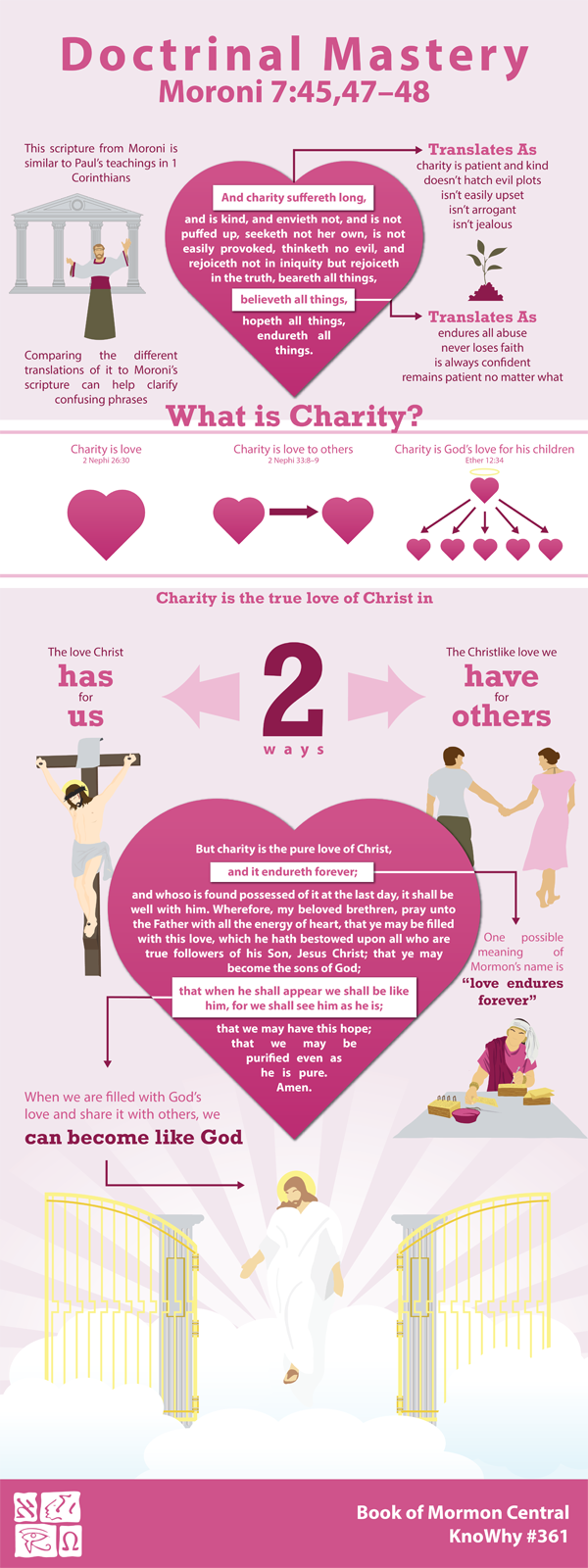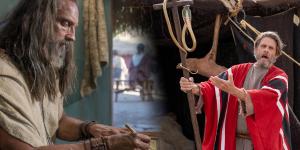You are here
What Does It Really Mean to Have Charity?

Moroni 7:45, 47–48
Content and Context
Near the end of his record, Moroni recorded a speech that his father gave, in which Mormon explained the significance of faith, hope, and charity.1 Mormon stated that “charity suffereth long, and is kind, and envieth not, and is not puffed up, seeketh not her own, is not easily provoked, thinketh no evil, and rejoiceth not in iniquity but rejoiceth in the truth, beareth all things, believeth all things, hopeth all things, endureth all things” (Moroni 7:45).2 Comparing Mormon’s speech to Paul’s similar description of charity in 1 Corinthians can help shed light on Mormon’s teachings.3
One of the things Paul’s statement helps to explain is the list describing charity. Phrases like “suffereth long” and “is not puffed up” can be confusing for some modern readers. However, this could also be translated as “charity is patient and kind, isn’t jealous, isn’t arrogant, doesn’t insist on getting his own way, isn’t easily upset, doesn’t hatch evil plots, doesn’t rejoice in unrighteousness, but rejoices in faithfulness.”4 Instead of “believing all things” which makes charity seem naïve, the end of the list can actually be translated as, “endures all abuse, never loses faith, is always confident, and remains patient no matter what happens.”5
Mormon then elaborated that “charity is the pure love of Christ, and it endureth forever” (Moroni 7:47). The Greek word translated as charity in 1 Corinthians 13 can be used to describe both the love of God and the highest form of love people have for each other.6 This is how the word is used in the Book of Mormon as well.
In 2 Nephi 26:30, for example, everyone is commanded to have charity, “which charity is love.” Later, in 2 Nephi 33:8–9, Nephi says that he has charity for the Jews and Gentiles, showing that charity is not just the love of God, but the love that Nephi possessed for other people.7 However, in Ether 12:34, Moroni states that the love that God “hast had for the children of men is charity.” Thus, charity in the Book of Mormon, as in the New Testament, can describe God’s love for us and our love for each other.8 Charity is therefore the true love of Christ in two ways: the love Christ has for all humankind and also the Christlike love that all men and women should have for each other.
Doctrinal Mastery Moroni 7:45,47–48 Infographic by Book of Mormon Central
Mormon then alluded to the Psalms to help explain charity even more. The Hebrew word for charity, which describes both God’s covenantal love for humanity, and our love for each other, appears often in Psalm 136. This psalm includes a long list of God’s acts of charity towards men, where each verse ends with the phrase “for his [charity] endureth forever.” Mormon also included a long list about charity, and similarly stated that God’s charity “endureth forever.”9
This can cause the reader to think about all of God’s mercy towards us, as listed in the psalm, and remind us that He will never abandon us, just as we should never abandon each other. It is fitting that one possible meaning of Mormon's name is "love endures forever." Thus Mormon's greatest sermon was simply an explanation of the meaning of his own name.10
Doctrine and Application
This verse reminds us all that “we can love and serve God by choosing to love and serve others”11 and that we can help others to experience the love of God through our own actions. To achieve this, we all must “pray unto the Father with all the energy of heart” that we might “be filled with this love, which he hath bestowed upon all who are true followers of his Son” (Moroni 7:48). Once we are filled with the love of God, this love can overflow from us, spreading to those around us. In this way, we show our love for God by sharing His love with others.
Once we begin to love others with God’s love, the love we have allowed God to fill us with, we can “become the sons of God; that when he shall appear we shall be like him, for we shall see him as he is” (Moroni 7:48). When we are filled with God’s love, and share it with others, we become like God, who also seeks to share His love with mankind.12 This means that the commandment to have charity is a command to demonstrate love to humanity with a steadfastness and power that can come only through divine means.
It is through charity “that we may have this hope; that we may be purified even as he is pure” (Moroni 7:48). People must experience the love of God, and then they must demonstrate it. They must love others the way that God loves them.13 In other words, they must experience “grace, that they might have charity” (Ether 12:36). Loving people the way God loves them can purify our minds and hearts, allowing us to love God more completely.
Further Reading
Dieter F. Uchtdorf, “The Infinite Power of Hope,” Ensign, November 2008, 21–24, online at lds.org.
W. Cole Durham, Jr., “Moroni,” Ensign, June 1978.
Jeffrey R. Holland, “Mormon: The Man and the Book, Part 1,” Ensign, March 1978, online at lds.org.
- 1. For more on sons recounting the words of their fathers in the Book of Mormon, see Brant A. Gardner, Second Witness: Analytical and Contextual Commentary on the Book of Mormon, 6 vols. (Salt Lake City, UT: Greg Kofford Books, 2007), 5:85.
- 2. For more on this, see Larry E. Dahl, “Faith, Hope, Charity,” in The Book of Mormon: The Keystone Scripture, ed. Paul R. Cheesman (Provo, UT: Religious Studies Center, Brigham Young University, 1988), 137–150.
- 3. For more on connections between the New Testament and the Book of Mormon, see Book of Mormon Central, “Why Did Jesus Deliver a Version of the Sermon on the Mount at the Temple in Bountiful? (3 Nephi 12:6),” KnoWhy 203 (October 6, 2016).
- 4. William F. Orr and James Arthur Walther, 1 Corinthians: A New Translation, Introduction with a Study of the Life of Paul, Notes, and Commentary, Anchor Bible 32 (Garden City, NY: Doubleday, 1976), 289.
- 5. Paul Ellingwort and Howard Hatton, A Translator’s Handbook on Paul’s First Letter to the Corinthians, Helps for Translators (New York, NY: United Bible Societies, 1985), 261.
- 6. Joseph A. Fitzmyer, 1 Corinthians: A New Translation, Introduction with a Study of the Life of Paul, Notes, and Commentary, Anchor Bible 32 (Garden City, NY: Doubleday, 2008), 489.
- 7. For more on the unlimited nature of God’s love, see Joseph Fielding McConkie and Robert L. Millet, Doctrinal Commentary on the Book of Mormon, 4 vols. (Salt Lake City, UT: Bookcraft, 1987–1992), 1:308.
- 8. Hugh Nibley, Since Cumorah, The Collected Works of Hugh Nibley, Volume 7 (Salt Lake City and Provo, UT: Deseret Book and FARMS, 1988), 347.
- 9. It may be significant that Psalm 136 includes a list of 26 acts of charity by God, and Mormon’s list, unlike Paul’s, includes exactly 13 points: exactly half.
- 10. Matthew L. Bowen, “’Most Desirable Above All Things’: Onomastic Play on Mary and Mormon in the Book of Mormon,” Interpreter: A Journal of Mormon Scripture 13 (2015): 27.
- 11. Doctrinal Mastery: Core Document (Salt Lake City, UT: The Church of Jesus Christ of Latter-day Saints, 2016), 11, online at lds.org.
- 12. Mormon’s delivery of this speech is even more significant when one considers that he saw his whole civilization collapse due to lack of charity. See Thomas W. Mackay, “Mormon and the Destruction of Nephite Civilization (Mormon 3–9),” in Book of Mormon, Part 2: Alma 30 to Moroni, Studies in Scripture, Volume 8, ed. Kent P. Jackson (Salt Lake City, UT: Deseret Book, 1988), 231–244.
- 13. D. Kelly Ogden and Andrew C. Skinner, Verse by Verse: The Book of Mormon, Volume 1: 1 Nephi through Alma 29 (Salt Lake City, UT: Deseret Book, 2011), 362.
KnoWhy Citation
Related KnoWhys
Subscribe
Get the latest updates on Book of Mormon topics and research for free






